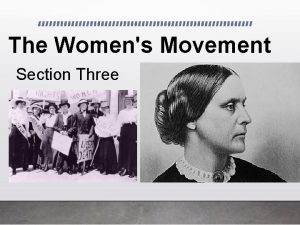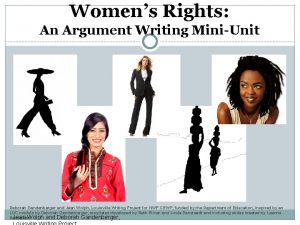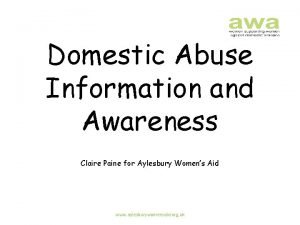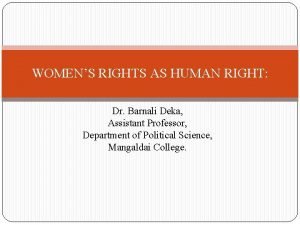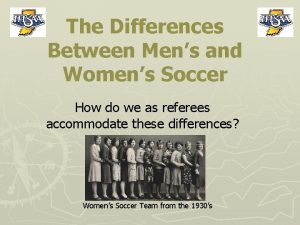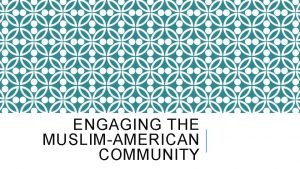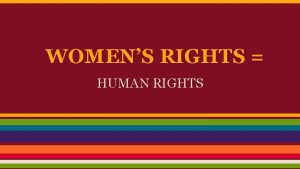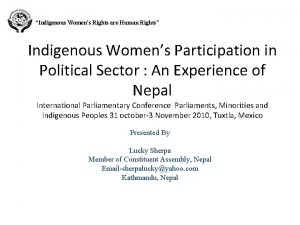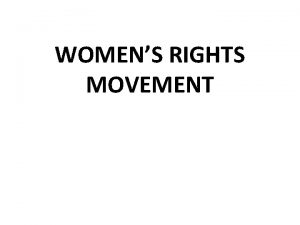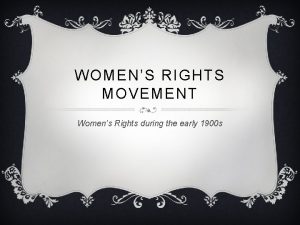Womens Rights General description of womens rights Womens










- Slides: 10

Women’s Rights

General description of women’s rights ▪ Women’s rights are the fundamental human rights that were enshrined by the United Nations for every human being on the planet nearly 70 years ago. These rights include the right to live free from violence, slavery, and discrimination; to be educated; to own property; to vote; and to earn a fair and equal wage. These rights are equal as men’s rights.

A short list of women’s issues ▪ Child Marriage. ▪ Domestic Violence. ▪ Domestic Workers. ▪ Gender Equality. ▪ Labor Rights in the Garment Industry. ▪ Reproductive Rights and Abortion. ▪ Sexual Violence and Rape. ▪ Women and Armed Conflict. And many more.

Most common violations of female’s rights ▪ 1. Workplace Inequalities Around the World…Including the United States For most Americans, it isn’t a secret that women still face extreme disadvantages in the workplace. ▪ 2. Skewed Gender Ratios In some countries, where population control laws were put into a much stricter affect, gender ratio disparities are skyrocketing. ▪ 3. Violence According to a statement made by U. N. Secretary-General Ban Ki-moon in 2008, one in every three women is likely to be “beaten, coerced into sex or otherwise abused in her lifetime. ”

Most common violations of female’s rights ▪ 4. Marriage and Divorce According to UNICEF, more than one-third of women between the ages of 20 and 24 were married before they turned 18, which is considered below the minimum age for marriage in most countries. Nevertheless, these child brides risk greater chances of giving birth at earlier ages and suffer from risks of complications in childbirth and a greater chance of contracting HIV/AIDS. ▪ 5. Education Women currently make up two-thirds of the world’s illiterate adults. Whether they are kept from school in order to keep up with household chores or their father deems it time for them to marry, women are consistently being denied their right to education; a right hardly ever denied to their male counterparts.

Famous women fighting for their rights ▪ Women have been fighting a war for their rights since 1848. -1920. That means they have spent about 70 years fighting for equal rights. Many women didn’t see the end of this war , but in the end the feminists won. Today, in the 2018, feminists are fighting for positive discrimination towards men, so in my opinion that is not feminism. Here’s a short list of TRUE feminists who have greatly contributed to TRUE equal rights.

Wilhelmina Drucker (1847– 1925) ▪ Was a politician, a prolific writer and a peace activist, who fought for the vote and equal rights through political and feminist organisations she founded. In 1917– 1919 her goal of women's suffrage was reached.

Lucretia Mott ▪ Lucretia Mott was a U. S. Quaker, abolitionist, women's rights activist, and social reformer. She had formed the idea of reforming the position of women in society when she was amongst the women excluded from the World Anti-Slavery Convention in 1840.

Lucy Stone ▪ Lucy Stone was a prominent U. S. orator, abolitionist, and suffragist, and a vocal advocate and organizer promoting rights for women. In 1847, Stone became the first woman from Massachusetts to earn a college degree.

IN CONCLUSION Feminism is a range of political movements, ideologies, and social movements that share a common goal: to define, establish, and achieve political, economic, personal, and social equality of sexes. First wave feminism succeeded in winning women their rights, and the women’s day was decided to be the 8 th of March. Nowdays feminism became a real issue since men , mostly in the USA, UK, and Canada are being assaulted by so called “feminists”, who are fighting for “equal rights” which have been won almost a hundred years ago. Respect women.
